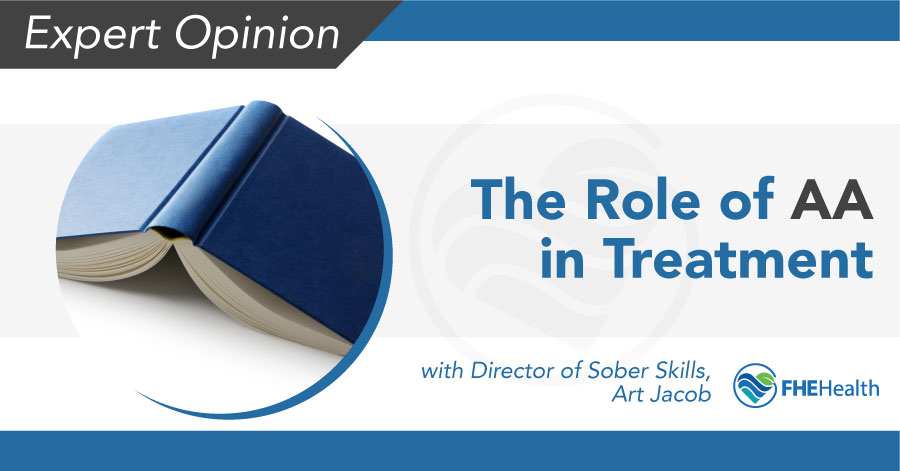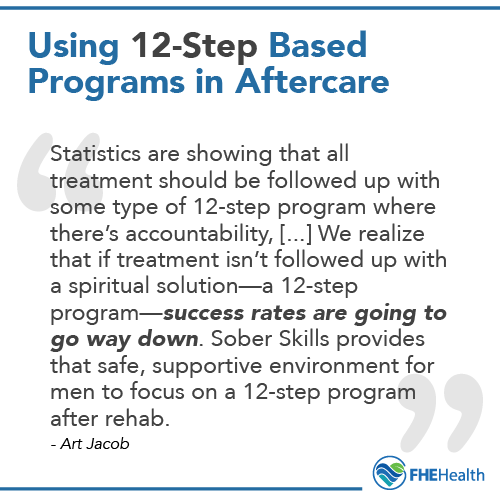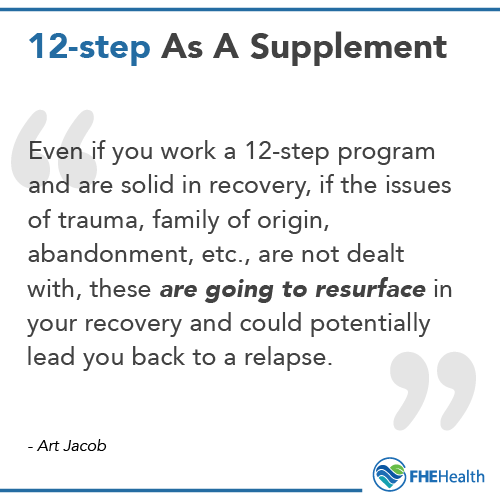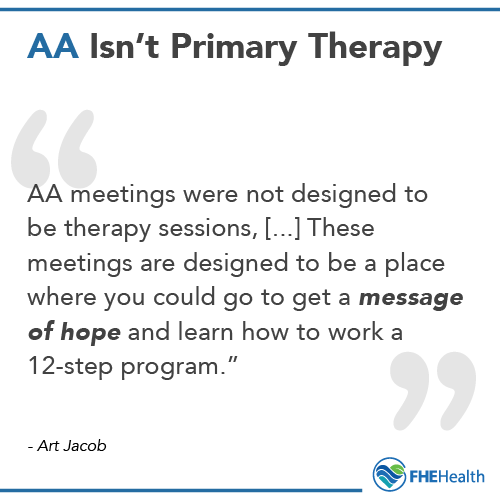
This article has been reviewed for accuracy by our peer review team which includes clinicians and medical professionals. Learn more about our peer review process.
Since its founding in 1935 by Bill Wilson and his friend, the physician Dr. Bob Smith, Alcoholics Anonymous (AA) has grown to become the most widely recognized program for drug and alcohol recovery in this country, having helped millions and millions of people achieve lasting sobriety. Today the organization boasts more than 115,000 groups worldwide, while thousands of other support groups—for addictive or unhealthy behaviors ranging from codependency and love and sex addiction to overeating and gambling—have sprung up around AA’s signature, 12-step formula for spiritual recovery.
 Art Jacob is a longtime veteran of AA and the 12 Steps. As the director of FHE Health’s Sober Skills program, he oversees a 12-step-based, residential program for individuals who have finished 30-plus days of inpatient treatment and are interested in a solid foundation in long-term sobriety.
Art Jacob is a longtime veteran of AA and the 12 Steps. As the director of FHE Health’s Sober Skills program, he oversees a 12-step-based, residential program for individuals who have finished 30-plus days of inpatient treatment and are interested in a solid foundation in long-term sobriety.
Jacob became a strong advocate of 12-step recovery after it helped him overcome his own battle with drugs and alcohol. But Jacob is also the first to acknowledge that individual willingness is the key: that for the 12 Steps to be effective for anyone, they need to want to participate in AA rather than feel as if they have been forced to be there.
In a recent interview, Jacob shared about how AA works in treatment, as well as its history and success rates as a rehab intervention. He also addressed some of the more common reasons that patients can be hesitant about AA and may choose other alternatives; and he mentioned the importance of being free to choose between AA and other options.
History and Success Rates of AA and the 12 Steps in Treatment
AA and the 12 Steps have for many years been an element of traditional addiction treatment programs, according to Jacob. He noted that “back in the 70s or 80s the majority of treatment facilities were 12-step facilities.” Today many treatment centers continue to embrace 12-step groups— in good part because they are associated with better treatment outcomes, research has concluded.
That research certainly aligns with the admittedly more anecdotal experience of Jacob, who for more than 10 years has been tracking clients’ progress after they leave Sober Skills. Jacob said “eight out of 10 clients are clean today,” meaning that while it’s possible they may have relapsed once or more, they are sober today. (He added that when former clients do relapse, he is quick to get them back; the relapse doesn’t last long and many of those who relapse continue to stay sober.)
“Statistics are showing that all treatment should be followed up with some type of 12-step program where there’s accountability,” Jacob said. “We realize that if treatment isn’t followed up with a spiritual solution—a 12-step program—success rates are going to go way down. Sober Skills provides that safe, supportive environment for men to focus on a 12-step program after rehab.”
How AA Works in Treatment
 How, then, does the “spiritual solution” of AA work in treatment? The answer to that question starts with understanding the difference between AA and addiction treatment.
How, then, does the “spiritual solution” of AA work in treatment? The answer to that question starts with understanding the difference between AA and addiction treatment.
Inpatient treatment focuses on addressing the individual roots of substance abuse, whatever these may be (trauma and PTSD, a co-occurring disorder, unresolved relationship issues, etc.). AA, in contrast, serves as a non-clinical, spiritual peer support group, meaning it should never substitute for the therapies that licensed clinicians administer in rehab.
In this sense, 12-step groups play more of a complementary, adjunct role in treatment (as opposed to serving as the treatment itself). Here is how Jacob explained it: “Even if you work a 12-step program and are solid in recovery, if the issues of trauma, family of origin, abandonment, etc., are not dealt with, these are going to resurface in your recovery and could potentially lead you back to a relapse.” His recommendation to anyone battling alcohol addiction is, therefore, to get into a treatment program first and from there start attending AA.
Second, during early recovery when “treatment is vital and therapy is crucial,” patients often receive at best a light introduction to the 12 Steps. For deeper immersion in the 12 Steps, they usually benefit from an extended care option (following rehab) to complete the 12 Steps and gain mastery of the spiritual principles.
Jacob, describing the typical rehab experience, put it this way: “Because patients are working on therapeutic issues and trauma, there is just not enough time in 30 days to do both and complete both [therapy and the 12 Steps].”
Where AA is of most help, then, is as a highly effective program for aftercare and continuing support for those who have completed a rehab program and are looking to maintain their sobriety.
Some of the More Common Reasons Patients Are Hesitant About AA
 Jacob said some patients enter treatment with negative perceptions of AA and the 12 Steps. One of the most common: “seeing the word ‘God’” in 12-step literature. Many patients have negative, even abusive childhood associations with God and religion and therefore have concerns about the notion of a “Higher Power.” Others worry that AA is Christian or religious, when in fact, Jacob said, “AA is not a religious program; it’s a spiritual program and nowhere in our literature do we mention who your god has to be.” He noted that there is actually a whole chapter for agnostics in AA’s Big Book.
Jacob said some patients enter treatment with negative perceptions of AA and the 12 Steps. One of the most common: “seeing the word ‘God’” in 12-step literature. Many patients have negative, even abusive childhood associations with God and religion and therefore have concerns about the notion of a “Higher Power.” Others worry that AA is Christian or religious, when in fact, Jacob said, “AA is not a religious program; it’s a spiritual program and nowhere in our literature do we mention who your god has to be.” He noted that there is actually a whole chapter for agnostics in AA’s Big Book.
Other patients may have concerns as to whether the 12 Steps really work. In some cases, a patient may have been reading some of the negative press about AA in recent years, including how some treatment centers have allegedly taken a coercive, borderline-hazing, 12-step approach that has hurt patients’ welfare. Such concerns, while justified, need contextualization: most good treatment centers will not mandate that their patients have to be in AA.
In other cases, a patient may have concluded that AA doesn’t work on the basis of their own personal experience: They may have briefly attended AA but dropped out prematurely, having never reached Step 12 or truly “worked the program” in AA lingo. The implication: that if they had really worked the 12 steps to their completion, they may have experienced a better outcome.
Alternatives to AA
That said, there are alternatives to AA, such as Rational Recovery and SMART Recovery, that trusted treatment centers make available to patients who don’t want to be in AA. Motivation is key to recovery, so if a person has real qualms about AA and isn’t sure they want to be there, they may benefit from being in a group where they feel more at home and are more motivated to succeed. In some cases, the best plan of aftercare for someone fresh out of rehab may be weekly therapy.
“AA meetings were not designed to be therapy sessions,” Jacob said. “These meetings are designed to be a place where you could go to get a message of hope and learn how to work a 12-step program.”
It’s a message of hope and a program for spiritual transformation that Jacob is convinced can work for anyone who gives it a fighting chance.






